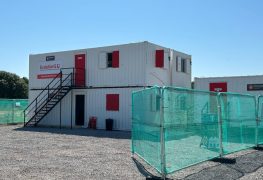If you’re a landlord, property owner, or estate manager, you’ve probably heard about the new Remediation Bill but might be unsure what it means for you.
What is the Cladding Remediation Bill?
The Building Safety Act 2022, and new Remediation Bill, places clear responsibilities on anyone responsible for residential buildings with unsafe cladding. With strict deadlines now in place, landlords and property managers now face accountability for ensuring cladding is safe.
Understanding these deadlines and putting the remediation process in action early on is critical, not only to avoid potential fines or prosecution, but also to prevent delays in property sales or mortgages.
Who This Deadline Affects
The new deadlines don’t just apply to landlords. They also impact anyone responsible for the safety of residential buildings, including:
- Estate managers and property management companies overseeing multiple buildings.
- Freeholders and housing associations responsible for building safety.
- Any party legally responsible for the external wall safety of a residential building.
If your building has unsafe cladding, the clock is ticking:
- Buildings over 18m: remediation must be completed by 31 December 2029.
- Buildings 11–18m: remediation must be completed by 31 December 2031.
Ignoring these deadlines isn’t an option. That’s why tackling this head on and getting expert guidance from experienced consultants like Evolution5 is crucial. Protect your building, your residents, and your investment!
Why You Need to Act Now
Here’s the reality, more than half of the 5,052 buildings with dangerous cladding have yet to be remediated. If you’re responsible for a building, waiting isn’t an option. Under the new legislation, Homes England and local councils can step in to carry out remediation if landlords fail to act.
A few key points to keep in mind:
- Time is tight: Landlords of buildings over 18m have around 52 months to complete remediation. But most projects—especially multi-building, high-rise developments—take 18–24 months on-site, plus another 18 months for pre-construction planning (surveys, designs, funding applications, and approvals).
- Starting early is key: The Remediation Bill is designed to get projects underway faster, but bottlenecks can still happen due to funding decisions and Building Safety Regulatory approvals.
The bottom line? Start now to ensure a smoother project, avoid costly delays, and reduce the risk of fines or enforcement action.
10 Steps to Get Started
Here’s how Evolution5 helps landlords and estate managers kick things off:
- Identify your building’s height and any unsafe cladding.
- Register buildings over 18m with the Building Safety Regulator.
- Secure funding through the Building Safety Fund or Cladding Safety Scheme.
- Commission a PAS9980-compliant fire risk assessment (FRAEW).
- Appoint project consultants to manage planning, design, and approvals.
- Select a qualified contractor to carry out the work.
- Obtain necessary approvals from Building Regulations or the Building Safety Regulator.
- Sign grant agreements and demonstrate cost recovery where applicable.
- Carry out remediation works while staying compliant with funding requirements.
- Complete inspections and statutory sign-offs, including updated EWS1 forms.
How Evolution5 Makes Cladding Remediation Easier
Working with landlords and estate managers, we understand this can be overwhelming, but rely on Evolution5 to provide support and expert guidance:
- Project Management & Cost Consultancy to keep your project on schedule and on budget.
- Contract Administration & Employer’s Agent Services to ensure the work is done right, first time.
- Funding & Regulatory Guidance to navigate government schemes and approvals.
- Specialist Surveys & Design Oversight –to ensure PAS9980 compliance and quality control.
Case Studies: Proven Expertise
Waterfront House, Bath (£1.5m)
- Managed cladding remediation for a 7-storey grade II listed building, navigating complex listed building approvals and logistics.
Malt House, Bristol (£5.8m)
- Delivered project management for a 10-storey development, resolving funding issues and coordinating party wall awards.
Watermark, Cardiff (£12.4m)
- Oversaw a 9-storey waterfront development, managing off-site logistics and council approvals to ensure smooth remediation.
Delivering Compliance and Safety
With deadlines approaching fast, think smart and start planning now. Evolution5 will guide you through every step, ensuring your building meets the Building Safety Act 2022 requirements while helping you avoid delays, fines, or complications with property sales.
From initial surveys and funding applications to project management and contractor oversight, we make the cladding remediation process smooth, efficient, and fully compliant.
Make your remediation project stress-free and successful. Get in touch with Evolution5 today.
Frequently Asked Questions
What is cladding remediation?
Cladding remediation is the process of removing or replacing unsafe external cladding materials on residential buildings, particularly where fire safety concerns exist. This could involve partial or full replacement of cladding, insulation, or fire barriers.
It’s a critical step to ensure buildings comply with the Building Safety Act 2022 and meet modern fire safety standards. Unsafe cladding not only puts residents at risk but can also prevent property sales or mortgage approvals. Starting remediation early ensures your building is safe, compliant, and marketable.
Who does the new Remediation Bill affect?
The new Remediation Bill applies to anyone responsible for the safety of residential buildings with unsafe cladding. This includes:
- Private landlords
- Estate managers and property management companies overseeing multiple buildings
- Freeholders and housing associations responsible for building safety
- Any party legally responsible for the external wall safety of a residential building
If you manage or own a residential property over 11m in height, it’s essential to understand your responsibilities under the Building Safety Act 2022 and make sure your building is fully compliant with the latest cladding remediation requirements.
What happens if I don’t comply with the new Remediation Bill?
Failure to comply with the Remediation Bill can have serious consequences:
- Unlimited fines or prosecution for building owners or landlords
- Government intervention, where Homes England or local councils can step in to remediate the building
- Delays in property sales or remortgages, as mortgage lenders may refuse loans without updated safety certification
Non-compliance can also impact your reputation and may increase liability if a fire or incident occurs. Early action is essential to avoid these risks.
When do I need to complete cladding remediation under the new Remediation Bill?
If your building has unsafe cladding, the deadlines are fast approaching:
- Buildings over 18m: remediation must be completed by 31 December 2029
- Buildings 11–18m: remediation must be completed by 31 December 2031
Ignoring these deadlines isn’t an option. That’s why it’s crucial to tackle cladding remediation head-on and seek guidance from experienced consultants like Evolution5. Early action will help you protect your building, your residents, and your investment, while ensuring compliance with the Building Safety Act 2022.
What is PAS9980 and why is it important?
PAS9980 is the Publicly Available Specification for fire risk appraisal and assessment of external wall construction in existing residential buildings.
It sets out the standards surveyors must follow when assessing fire risk on external walls, including cladding, insulation, and fire barriers.
Using a PAS9980-compliant surveyor ensures that:
- Your building’s fire risk is accurately assessed
- Any remediation works meet the Building Safety Act 2022 requirements
- Mortgage lenders can approve EWS1 forms, allowing property sales or remortgages to proceed
Why should I act now on cladding remediation?
Starting early is critical. While the Remediation Bill is designed to get projects underway faster, delays can still occur due to funding decisions and Building Safety Regulator approvals.
Acting now helps ensure a smoother project, avoids costly delays, and reduces the risk of fines or enforcement action. Early action also gives you peace of mind and control over compliance with the Building Safety Act 2022.





